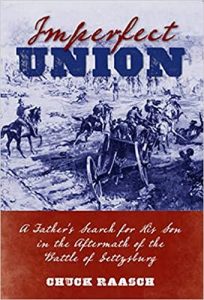Book Review: Imperfect Union: A Father’s Search for his Son in the Aftermath of the Battle of Gettysburg
 Imperfect Union: A Father’s Search for his Son in the Aftermath of the Battle of Gettysburg
Imperfect Union: A Father’s Search for his Son in the Aftermath of the Battle of Gettysburg
By Chuck Raasch
Stackpole Books, 2016, $24.95
(2021 paperback reprinting)
Reviewed by Bert Dunkerly
Author Chuck Raasch brings us a unique angle on Gettysburg, the war, and personal loss. Throughout the book he emphasizes the lingering effects of the war and in particular an event like Gettysburg. Raasch uses the phrases “the aftermath continues” and “the forever” to illustrate his point. While we often focus on the heat of battle and brave deeds in studying the Civil War, broken men, shattered families, and empty chairs at the table are the reality that they lived with forever after.
The book follows the parallel story of a father and son: Sam Wilkeson and Bayard. The father is a reporter with the New York Times, and his son is a lieutenant commanding a battery of Union artillery. They both end up at Gettysburg. Upon learning of his son’s wounding the first day, Sam has to deal with the agonizing reality of not knowing his fate, and being unable to find him.
In telling the story, Raasch introduces us to the experiences of war correspondents and their relationship with the administration and the military. It was often a world of political maneuvering and personal privation. In the larger picture, Raasch sheds light on media during the war: how news was gathered, transmitted, and served agendas. Correspondents were the vital connection between home front and the military front, between the war effort and society, and understanding their role is an important part of seeing the entire conflict.
Bayard’s unit, the 4th US Artillery, Battery G, was part of the Eleventh Corps and marched north into Pennsylvania towards Gettysburg in late June 1863. They ended up on Barlow’s Knoll on July 1, an isolated rise north of town. This exposed position received tremendous fire from the Confederates and was soon overrun by vastly superior numbers. Bayard was severely wounded in the leg as the Union line collapsed.
Sam would not know for several days the fate of his son after the battle, only that he was wounded, or maybe dead, and that he was behind Confederate lines. We then follow Sam’s tortuous journey to find Bayard, an odyssey through dingy and appalling field hospitals in houses, barns, and public buildings.
Bayard had been removed to the Gettysburg Almshouse, which was being used as a makeshift hospital. He lingered several hours before dying that evening. Buried in a shallow unmarked grave outside the building along with other dead, his father and uncle finally found the body on July 4. They had to watch as the graves were opened, and bodies examined until they found Bayard.
Sam then proceeded to write his dispatch on the battle, next to his son’s body. His report summarized the fighting and made judgements on several decisions (including criticizing the decision to occupy Barlow Knoll). His account is clear and concise, and even now historians consider it one of the best summaries of the battle written by a reporter on the scene. That he managed to compose it while next to his dead son’s body is a tribute to his resolve, or perhaps his way of dealing with the trauma.
Sam had his son’s body embalmed and sent home to Buffalo, where he was buried in the family plot. For years afterwards Sam struggled to come to terms with Bayard’s death. As the author emphasizes, we often focus on the heroic hour of fighting, yet the impact of loss was permanent and long lasting. While we know that people suffered loss during the war, this investigation takes us into one family’s unique experience.
The book reads like a novel and provides vivid detail. There are some inaccuracies which are distracting, such as calling the Confederate force the Army of Virginia. Additional illustrations and maps would have also added to the text. Overall, it is worth reading to see a different side of the war.

Every time I hear or read this story I am moved; I cannot comprehend the fear and sense of loss that the father must have felt throughout the battle.
Great review, Bert. Sounds like must reading for anyone trying to understand the non-military sides of the Civil War.
Thanks, yes I learned a lot about many new topics.
I plan to get this book, based on this review.